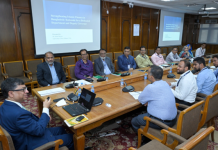
• Fraudulent Investment Scheme: Chuti Group allegedly defrauded investors of hundreds of crores of taka by selling shares of resort and housing projects—especially “Chuti Resort Cox’s Bazar”—through false promises of ownership, high returns, and luxury living.
• Multiple Sales of Same Property: The group reportedly sold the same resort units to multiple investors under a deceptive “time-sharing” model, without disclosing overlapping ownership, and provided no legal documents or registered deeds.
• Use of Misleading Marketing: Attractive women and glamorous advertising campaigns were used to lure in investors, particularly targeting expatriates, middle-class families, and those with undeclared income, promising benefits like “halal” profit, lifetime access, and inheritance rights.
• Minimal Progress Despite Large Fundraising: While over 3,500 shares at Tk 6.5 lakh each were sold, only around 3% of construction has been completed, with no substantial development seen in years.
• Calls for Legal Action: Victims are demanding immediate intervention, highlighting the company’s history of stalling refunds, issuing false assurances, and engaging in unethical practices involving landowners, staff, and investors over a span of more than a decade.
In what is shaping up to be one of the most alarming investment scams in recent memory, the “Chuti Group” is under serious scrutiny for allegedly defrauding thousands of investors of hundreds of crores of taka through a string of fraudulent real estate and resort ventures.
The group’s flagship project — Chuti Resort Cox’s Bazar — has been marketed as a luxury five-star destination, with promises of land ownership, high returns, and lifelong benefits. However, behind these glossy advertisements and high-profile marketing campaigns lies a web of deceit that victims say has cost them their life savings.
According to multiple investor testimonies, Chuti Group launched aggressive promotional campaigns offering shares priced at BDT 6.5 lakh each. These shares came with promises of:
• Individual room ownership with registered land deeds (saf-kabla)
• Annual profits of 15–20%, estimated at up to BDT 120,000 per share
• Free stays at Chuti resorts and 50–70% discounts on club memberships
• Transferable and inheritable rights over the investment
• “Halal” profit models marketed toward religiously observant investors
However, investors allege that many of these promises were empty from the beginning. Most notably, the same rooms were reportedly sold to multiple investors, through a concealed “time-sharing” model without proper disclosure. In practice, no one received full ownership, and registered documentation was never provided.
Despite bold commitments to complete the Cox’s Bazar resort by 2027 and issuing around 3,500 shares to fund construction, insiders reveal that less than 3% of the project has been completed to date.
Other projects including Chuti Aronyobash in Gazipur, Chuti Harmony, and Chuti Bay, have also reportedly stalled or remained in perpetual planning stages, while investor funds continue to flow in.
Real estate professionals and victims alike are raising serious doubts about whether these projects will ever reach completion.
Sources say that to attract unsuspecting investors, particularly expatriates and middle-income families, Chuti Group utilized unethical marketing practices, including the alleged use of attractive female agents to lure potential clients. Some victims described these sales methods as manipulative and predatory.
Moreover, the group’s managing leadership has come under fire for past misconduct. Managing Director Engineer Mizanur Rahman was previously dismissed from RAJUK due to corruption charges. Fellow directors Mostafa Kamal and Masudur Rahman Masud face additional allegations ranging from drug dealings to sexual misconduct.
Several sales personnel and staff within the organization are also reported to have histories of unethical behavior, many having been dismissed Adding to the controversy, the group also operates a spin-off company — FNF Properties — to manage projects in Uttara and Bashundhara. Investors claim this company followed the same blueprint: collecting large sums through misleading promises, before stalling projects or abandoning them altogether.
Despite repeated appeals, investors report being stonewalled with delays, vague reassurances, and false refund promises. Many have only received nominal returns — as low as BDT 5,000–7,000 annually — which are attributed to “maintenance costs” or “future development,” leaving the principal amounts untouched and indefinitely withheld.Numerous disputes have since emerged between landowners and investors, as some of Chuti Group’s developments were built on leased or verbally agreed lands, with no official ownership transferred.
With the scam now spanning over a decade and involving possibly hundreds of crores of taka, victims and legal experts are calling on Bangladesh Bank, REHAB, the Anti-Corruption Commission (ACC), and the Ministry of Housing and Public Works to launch an immediate investigation.
Legal experts argue that Chuti Group’s model violates multiple consumer protection and land registration laws, and that the “registered ownership” claims were part of a calculated deception targeting vulnerable demographics.
As more victims come forward, the Chuti Group scandal is quickly escalating into a national crisis — not only due to the scale of financial loss but also due to its implications on public trust in real estate investment. Unless authorities take swift and decisive action, many fear that more citizens will fall prey to similar schemes operating under the guise of legitimate business ventures.
moni.////







